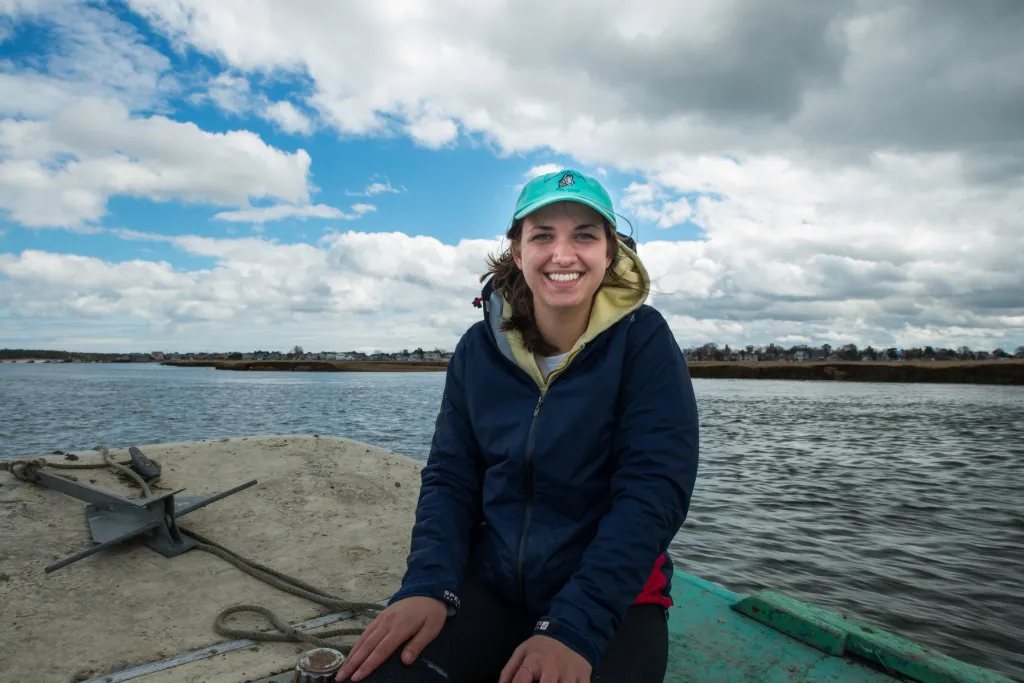
What will you study? Marine Entrepreneurship Curriculum Overview
Examples of Available Courses
There are many ways you can navigate this major. The following are just some examples of the fascinating courses that the Marine Entrepreneurship major offers:
- Discovering the Ocean Environment
- Entrepreneurship
- Environmental Economics
- Marine Biology
- Creating Social Enterprises
- The Marine Economy
Curriculum
| Nor’easter Core Requirements | Credits |
|---|---|
| Total Credits | 40 |
| COB Foundation Courses | Credits |
|---|---|
| BUEC 203 – Macroeconomics | 3 – Fulfills Power Knowledge & Justice - Social Science Core |
| BUEC 204 – Microeconomics | 3 – Fulfills Power Knowledge & Justice - Open Core |
| BUMG 120 – Innovation Through Technology | 3 – Fulfills Creativity and the Arts Core |
| MAT 120 – Statistics or MAT 150 – Statistics for Life Sciences or MAT 151 – Statistics for Environmental Sciences | 3 – Fulfills Quantitative Reasoning Core |
| Total Credits | 12 |
| Other COB Foundation Courses | Credits |
|---|---|
| BUAC 201 – Financial Accounting | 3 |
| BUFI 315 – Business Finance | 3 |
| BUMG 200 – Management | 3 |
| BUMG 325 – Legal Environment of Business | 3 |
| BUMG 495A/MAR 495 – Internship/Experiential | 3 |
| BUMG 498 – Strategic Management | 3 |
| BUMK 200 – Marketing | 3 |
| Total Credits | 21 |
| Marine Entrepreneurship Major Required Courses | Credits |
|---|---|
| BUEC 390 – Environmental Economics | 3 |
| BUFI 205 – Intro Data Analysis or DSC 225 – Computer Programming I | 3 |
| BUMG 101 – Introduction to Business/Excel | 3 |
| BUMG 301 – Organizational Behavior or BUMG 302 – Human Resource Mgmt or BUMG 307 – Operations Management | 3 |
| BUMG 410 – Creating Social Enterprises | 4 |
| BUMK 312 – Entrepreneurship/Sml Business | 3 |
| ENV 105 – Sustainability for a Healthy Planet | 3 – Fulfills Health of Natural Ecosystems Core |
| MAF 200 – Introduction to Marine Polution | 3 |
| MAR 105 – Introduction to Ecology & Evolution of Marine Organisms | 4 – Fulfills Scientific Method Core |
| MAR 150 – Discovering the Ocean Environment | 4 |
| MAR 250 – Marine Biology | 4 |
| Two (2) Biology/Marine Programs Electives (see below) | 6 |
| Two (2) Courses with the Prefix MAR, MAF or BIO | 6 |
| Total Credits | 49 |
| Open Elective Courses (as needed to reach 120 credits) | Variable |
| Minimum Total Required Credits | 120 |
|---|
Elective Courses
| Biology/Marine Electives | Credits |
|---|---|
| BIO 221 – Principles of Aquaculture | 3 |
| BIO 222/222L – Finfish/Shellfish Culture Techniques w/Lab | 4 |
| MAF 210 – Introduction to U.S Ocean Governance | 3 |
| MAF 310 – U.S. Ocean and Coastal Law | 3 |
| MAR 316 – Science and Society | 3 |
| MAR 331 – Biology of Fishes | 4 |
Please note: While some courses can fulfill both core and program requirements, the credits earned do not count twice towards the minimum total required credits for the degree.
Students in this major can participate in the pre-health graduate school preparation tracks.
To learn more about the program visit the Academic Catalog.
Honors Program
We offer qualified students the option of graduating with Honors. This includes significant research, scholarship or creative activity under the direction of a faculty member. Interested students should consult with their advisor.
To learn more about the program, see the Academic Catalog.

Green Learning Community
First-year Business, Communications, Sport Leadership and Management, and Marine Entrepreneurship majors are able to participate on a competitive basis in the Green Learning Community (GLC). The GLC is an intentional community of professors and first-year students dedicated to studying human relations to the environment through many ways of knowing. You will study environmental issues through the integrated lenses of biology, literature, environmental studies, and economics.
Honors Program
We offer qualified students the option of graduating with Honors. This includes significant research, scholarship or creative activity under the direction of a faculty member. Interested students should consult with their advisor.
of undergrads employed or in ongoing higher education within one year of graduating
college in Maine for student job placement following graduation
Career Paths for Marine Entrepreneurship Grads
Fuse your newly acquired knowledge of marine sciences and business in imaginative ways through research in the Marine Science Center and projects in our Makerspace. By combining these experiences with internships that expose you to marine industries and develop your business acumen, you can set your sails for success as a marine entrepreneur.
Marine Entrepreneurship majors may explore a wide variety of professions, including:
- Sustainable Business Developer/Consultant
- Ecotourism Coordinator
- Climate Change Analyst
- Fisheries Biologist
- Aquaculture Technician
- Seafood Broker
- Marine Policy Advisor
- Environmental and Marine Lawyer
Career Advising
Whether you have a specific career goal in mind or a vague idea of the field that interests you, Career Advising is here to help you plan your next step.
Meet Jillian, Marine Entrepreneurship graduate
Experiential Learning in Marine Entrepreneurship
UNE’s Marine Entrepreneurship major allows you to interact with people from marine communities in order to address real-world problems and consider real-world solutions. Make your idea a reality by creating a device prototype in our Makerspace. You may even enter your solution in UNE’s Student Innovation Challenge, a university-wide idea stage competition. From hands-on research in the lab to exciting internships in the field, you’ll be doing far more than getting your feet wet.
Research
UNE provides a breadth of research opportunities not commonly offered to undergraduate students. So whether you’re interested in fighting the effects of neurotoxic algae, exploring ways to use the invasive green crab as lobster bait, or using tidal energy to increase the productivity of oyster production, we have a research project for you.
Internships
We offer rewarding internships with industry partners, including:
- Biddeford-Saco Chamber of Commerce
- Saco River Salmon Club and Hatchery
- Simonton Cove, Inc.
- Shy Beaver Trout Hatchery, Inc.
- RAS Corporation
- Pentair Aquatic Eco-Systems
- Marine Ecological Habitats, Inc.
For more information, contact the CAS Internship Office Marine Sciences contact, Cynthia Simon at (207) 602-2540 or csimon@une.edu.
Global Education in Marine Entrepreneurship
See The World
Study Marine Entrepreneurship on the other side of the world by taking part in our Global Education Programs.
The world is your oyster. At UNE, your opportunities for study abroad are rich and plentiful. Spend a semester in Iceland, Spain, France, Norway, Finland, or at UNE’s own global campus in Morocco. Choose from several shorter travel courses that will take you to Belize, Panama, the Azores, Iceland, the Galapagos Islands, or many other exciting locations.
Interested in studying abroad? Make a plan with your advisor.

Apply Today
Ready to begin your future in UNE’s Marine Entrepreneurship program?
Bachelor of Science in Marine Entrepreneurship FAQ
How can I work in marine entrepreneurship?
The ocean presents a vast playground for imaginative people to dive into the world of marine entrepreneurship. If you're eager to combine your business acumen with your love for the sea, you can explore such areas as aquaculture, marine ecotourism, and the creation of new products made from ocean-sourced materials.
The UNE Marine Entrepreneurship degree combines the best of our business and marine sciences degrees, to position you for success in these marine business categories:
1. Sustainable Fisheries and Aquaculture:
- Develop innovative fishing practices: Implement technology and data-driven solutions to optimize catches, minimize bycatch, and ensure seafood traceability.
- Be an aquaculture farmer: Start or contribute to sustainable fish farms, oyster farms, kelp farms, and more.
- Create value-added products: Turn underutilized species or fishing byproducts into marketable products like fish jerky, protein powders, or even fertilizers.
2. Ocean Technology and Robotics:
- Develop underwater drones and sensors: Design equipment for ocean exploration, marine science research, and data collection for diverse purposes like environmental monitoring, resource management, or underwater archaeology.
- Offer robotics solutions: Build robots for underwater maintenance of offshore infrastructure, cleaning up pollution, or assisting with aquaculture tasks.
- Create data analysis platforms: Design tools that translate ocean data into actionable insights for various stakeholders, like fishermen, researchers, or policymakers.
3. Ecotourism and Sustainable Travel:
- Organize ecotours and ocean experiences: Offer responsible tourism that educates visitors about marine conservation while minimizing environmental impact.
- Develop responsible diving and snorkeling programs: Foster respect for underwater ecosystems and promote sustainable diving practices.
- Invest in eco-friendly lodging and transportation: Create sustainable accommodation options or boat tours that minimize their footprint on marine environments.
4. Marine Products and Services:
- Develop eco-friendly gear and apparel: Design and manufacture sustainable diving equipment, swimwear, or boat wear from recycled materials or with minimal environmental impact.
- Offer marine education and consulting: Share your knowledge through workshops, online courses, or consulting services for coastal communities or businesses seeking to operate sustainably.
- Create ocean-inspired art and crafts: Turn ocean debris or sustainably sourced materials into unique jewelry, home décor, or art pieces that raise awareness about ocean conservation.
5. Advocacy and Policy:
- Support ocean conservation organizations: Work with NGOs or foundations to raise funds, develop campaigns, and influence policy decisions for ocean protection.
- Become a marine policy expert: Advocate for sustainable ocean policies through research, communication, and collaboration with policymakers.
- Invest in innovative solutions: Fund or support startups developing cutting-edge technologies or approaches for ocean conservation and sustainable development.
It’s important to remember that marine entrepreneurship requires passion, dedication, and a strong understanding of the ocean environment and its challenges.
What is marine conservation, and how can business support it?
Marine conservation is the protection and preservation of the ocean and its diverse ecosystems. It's about safeguarding the intricate tapestry of life within the seas, from microscopic plankton to majestic whales, and the complex systems that sustain them.
The UNE Marine Entrepreneurship degree provides a foundation for ocean-based businesses that conserve and support the marine environment. We believe that the development of new ocean-based businesses creates an economic incentive for sustainable marine management. By linking economic growth with environmental health, we can build collaborations that sustain the ocean as a vibrant, healthy resource for people and nature.
What is the best marine entrepreneurship degree program for me?
To evaluate whether a marine entrepreneurship degree program fits your needs, start by looking at these important criteria.
Faculty
Seek out marine entrepreneurship programs with professors whose expertise matches your interests, in business areas like management and marketing, as well as in terms of marine industries and sustainability.
Faculty for UNE’s business and marine programs are knowledgeable and supportive, and many have accrued real-world experiences with ocean-based businesses.
Meet our College of Business faculty and professional staff
Meet our School of Marine and Environmental Programs faculty and professional staff
Curriculum
Evaluate the marine entrepreneurship curriculum to ensure that the courses align with your interests.
UNE's marine entrepreneurship program offers an outstanding foundation in business, with training in marketing, management, economics, international business, social innovation, and entrepreneurship. You’ll be mentored in applying all of these principles to ocean-based business concepts as you gain hands-on experience with aquaculture businesses, ocean ecotourism businesses, brands that develop value-added ocean products, and more.
Learn more about UNE’s B.S. in Marine Entrepreneurship curriculum
Career Goals
Choose a marine entrepreneurship degree program that aligns with your career aspirations and goals. Look for stories of past University students who have gone on to interesting ocean business ventures.
The UNE College of Business is committed to helping students achieve their goals. We prepare students for entry-level positions in the private or public sector and offer graduate-level coursework preparation. UNE has close partnerships with businesses across the marine space, which enables our students to build their professional network and experience career-starting internships.
Marine Entrepreneurship majors may explore a wide variety of professions, including:
- Sustainable Business Developer/Consultant
- Ecotourism Coordinator
- Climate Change Analyst
- Fisheries Biologist
- Aquaculture Technician
- Seafood Broker
- Marine Policy Advisor
- Environmental and Marine Lawyer
UNE students can work with our Academic and Career Advising Center to find a path that matches their passions. It doesn’t matter if you have a clear career goal or just a general interest in a field.
Learn more about Career Advising at UNE
Learning Environment
When looking for a college to study marine entrepreneurship, it’s important to consider the type of learning environment you will be immersed in.
At UNE, you can study and learn about marine entrepreneurship on the coast of Maine. Our seaside campus is located just feet from the ocean and our Marine Science Center is an ideal hub for research, housing an array of ocean clusters that focus on sea vegetables/seaweeds, aquaponics, aquarium sciences, and other areas related to the marine industry.
Financial Aid
Consider whether the school you're interested in provides financial aid or scholarships to support your education.
A UNE undergraduate education is affordable. Our tuition is 16% below the average tuition for private universities in New England. Plus, all incoming full-time undergraduate students at UNE will receive Merit Scholarships in amounts from $5,000 to $22,000 per year.
Learn more about grants and scholarships available to students at UNE
For more information contact Program Director Jeremy Pare at jpare@une.edu.
